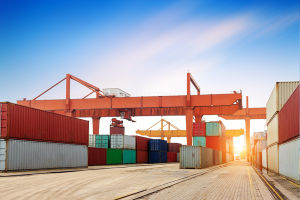As technology continues to evolve, our economy is shifting into a global state faster than ever before. Companies are shipping more and more products across international borders and while the internet of things (IOT) allows for instant communication, we still need physical transportation to get products to where they need to be.
This is where intermodal transportation comes in. For the uninitiated, intermodal transportation is about transporting freight in a container that’s fit for multiple modes of transport. The process starts with the intermodal container being moved by truck to a rail, then back to a truck to complete the process.
There are plenty of benefits to using intermodal transportation that transport companies should maximise. Read on to find out more about intermodal transport and why you should consider it.
Intermodal transport allows for flexible freight shipping

One of the main advantages of intermodal transport is that it enables you to explore all of the shipping methods available. There are plenty of ways to transport cargo on the ground including trucking and rail carriers. Not only that, but the air freight is also a viable alternative to both ground and maritime shipping options.
Companies like Reef Group offer numerous intermodal options for clients to choose from. It’s a good idea to do a bit of research and figure out which option best suits your needs. This can be achieved by weight the cost with the delivery time to help maximise its value.
It opens up alternatives for shipping lanes
Our economy operates based on supply and demand and the same thing goes for intermodal transport. For example, a company that’s based in a small city may find it expensive to transport freight over long distances; however, if the company can obtain its shipment from a more developed city, then the latter will have greater access to multiple shipping options.
Having a variety of shipping options can lead to cheaper shipment prices that the company can take full advantage of. It’s worth taking a short trip to a larger city before booking for the long haul which is why looking for alternate shipping lanes is highly recommended.
You only pay for the service you need

When contacting an intermodal shipping company for a shipping request, it’s best to check their available container options first. Most companies will charge for a full container load (FCL), even if the goods don’t exactly fill the container. Some will make you wait until the container is full before they ship it.
It should be in your best interest to look for a transport company that offers light container loads (LCL). That way, you won’t have to deal with slow shipping times. For example, if the shipping order needs 40 sq. ft. of space, you don’t have to pay for a 60-foot container just because it’s what the shipping company offered you.
What they can do instead is pair your shipment with others to fill up the container or ship out the LCL as soon as possible.
Networking is key
Intermodal shipping has grown considerably over the years and chances are that there’s another company within your area that’s utilising it to the fullest. Talk to local entrepreneurs and ask for recommendations based on what’s worked for them. Perhaps they’ve discovered a transport company with excellent services or provides tips on negotiating with shipping companies.
Networking is a very useful tool that can open a whole new world of possibilities. Make sure to ask your contemporaries to maximise the effectiveness of intermodal transportation for your company.
As you can see, intermodal transportation provides companies with plenty of benefits that can lead to more efficient operations. Reliable delivery time notifications, removing traffic and customs processes on the highway, leaner planning processes, and easier planning and support for large-scale projects are what makes intermodal transportation a viable solution for your unique shipping needs.
Knowing when to use intermodal transportation
Here are a couple of things to keep in mind to determine whether intermodal transportation fits your shipments perfectly.
- Intermodal transportation is ideal for intermediate and finished goods in load units below 25 tons.
- The longer the distance a shipment needs to travel, the more sensible it is to go intermodal. Freight moving more than 400 km, or longer than one day by truck, are perfect candidates for intermodal transportation.
- Cargo with intermediate values is mostly moved via intermodal transportation. Those with high values are often sent via the most direct methods, such as air cargo, and low-value shipments frequently travel via rail or ocean.
- Intermodal transportation is a good choice when cargo flow needs to be continuous and in similar quantities. For example, if you’re sending multiple LTL shipments to the same location throughout the week, you may want to consider using intermodal instead.
Here at Reef Group, we pride ourselves on providing reliable means of intermodal transportation that companies can take advantage of. With competitive pricing and world-class standards of customer service, our team can assist you with all your intermodal transport needs. Contact us today to learn more.
